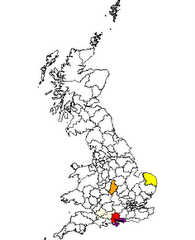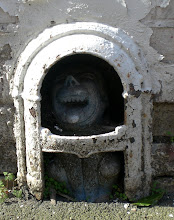Monday, July 9, 2007
What's In A Name?
"Yelf? - That's an unusual name? Where does it come from?" Anyone born a Yelf (or lucky enough to become one in later life) will be asked this question at some point. My own family legend had it that we were descendants from a Dutchman who came over to run the Isle of Wight Ferry, rowing backwards and forwards between the Island and Southampton. I also have memories of a plaque on the wall of "Yelf's Taps" a pub in Ryde on the Isle of Wight, claiming that the Yelf's were two Dutch brothers who presumably found the Wine & Spirit Trade a bit less strenuous than the ferry trade. In truth Yelf doesn't sound a very English name and it's not surprising that foreign influences were suspected. I half hoped that we were a forgotten branch of one of the great European houses the Welfs or Guelphs as they were known in Italy. Not much chance of that though and zero possibility of claiming Monaco in the name of Yelf sadly... The Oxford English Dictionary isn't much better either. There is a tiny entry for Yelf, defining it as a wooden shovel, specifically used cleaning out pig-stys. Not all that romantic but luckily I believe we can discount this one as well as the term is a local one and certainly not from the south of England! What does that leave then? What about the name Jelf, must be a connection there surely? Well no, again it seems not. The Jelfs are a Midland name and there's no overlap in the historic distribution so I think we can discount the Yelf/Jelf relationship. Where I do believe we score though is through the link I originally saw on the Mormon IGI index. On this Yelf is recorded as a variant of the slightly more common name of JOLLIFE and this is given credence by the almost identical distribution of the name, centring on Hampshire in general and the New Forest and Isle of Wight in particular as shown by this census distribution map of 1891, still showing the traditional bias of the name, despite both social and geographic mobility. Add to that the fact that Jolliffe is cited as being Anglo-Saxon for 'a jolly man' and I'm more than happy that this is a strong contender for the source of the name. But just as a teaser you can take this one step further. If Jollife is Anglo-Saxon for 'a jolly man', why is the name so local? Why does it not occur across the range of the old Saxon kingdoms of Essex, Wessex, Sussex and Middlesex (kingdoms of the East, West, South and Middle Saxons respectively) In fact why does it occur only in Hampshire a county surrounded by Saxons but not originally populated by them? Well, as it happens the area in question was part of one of the two Jutish kingdoms in England. Most schoolchildren learn that following the Roman evacuation Britain was invaded by the Angles, Saxons and Jutes. The Angles grabbed the east of the country (East Anglia) and the Saxons grabbed much of the south, as noted above, but what happened to the Jutes? Being the smallest of the three tribes their conquests were limited to two kingdoms, Kent and the Isle of Wight/Hampshire area. Eventually these Jutish kingdoms were invaded and absorbed by their Saxon neighbours and their culture absorbed or eradicated by possible Saxon ethnic cleansing (and note the number of possibly co-incidental but nevertheless suggestive place names begining with the letter 'Y' in that last linked article). Could it be that the Yelfs and their Anglo-Saxonised relatives the Jollifes are descendants of the inhabitants of the last Jutish kingdoms? Now there's an interesting possibility for DNA testing - could there be a genetic link between the Yelfs and inhabitants of the Jutish homeland of Jutland in Denmark? Maybe not Dutch after all, but Danish!
Subscribe to:
Post Comments (Atom)



2 comments:
Hi Yelfy, I just ran across a *fascinating* bit of information from an old book (1881) the "Parish Registers of Broad Chalke Co Wilts, from 1538 to 1780" edited by the Rev Cecil Gulden Moore. M.A. Vicar. In his lengthy preface he explains that he copied the information from vellum sheets, unbound papers, some bound books, a hodge-podge of records. He talks about some of the names, this one in particular: "In the Baptismal Register for 1540 there appears the name of John Yellow. Yelow; in the Marriage Register for 1609, Christopher Eilfe marries Jane Randoll.
In the Baptisms for 1611, there is the following entry: — Jane Eilffe d. Christopher Eilffe, but in the original manuscript the name Yellow is first written, in each case, and then struck through and Eilffe written above. In 1615, 1619, and 1622 this same Christopher has his surname spelt in three different ways, — 1st, Yekes; 2nd, Yellowes; and 3rd, Yelf.
There must have been something very peculiar in the common pronunciation of this name which could render possible such different versions of it in writing."
So what zackly was that name, and why "Yellow"? Deb at calexeditorATnucleusDOTcom
Hello, I wanted to share an observation regarding a possible connection between the name Yelf (almost exclusively Isle of Wight and Hampshire) and Jelf/Jelfs (predominantly Worcestershire and Gloucestershire). You explained that you have concluded that the two names are not connected because of the geographic distribution and separation of their "epicenters". What struck me is that in "A Calendar of Wills and Administrations Preserved in the Consistory Court of the Bishop of Worcestershire" (1451-1600) there are enties for Gelffe, Jelfe and Yelfe which are all cross-referenced by the indexers. In the early periods of record keeping, there was no consistent and agreed spelling (and maybe pronunciation?) for many words, including names. Those responsible for drawing up public records had no common education nor common approach to spelling. It seems possible that there were Yelf/Jelf/Gelf forebears co-existing and possibly related in the counties where the Jelf(s) spellings emerged later to be the agreed version/spelling of the family name.
Post a Comment